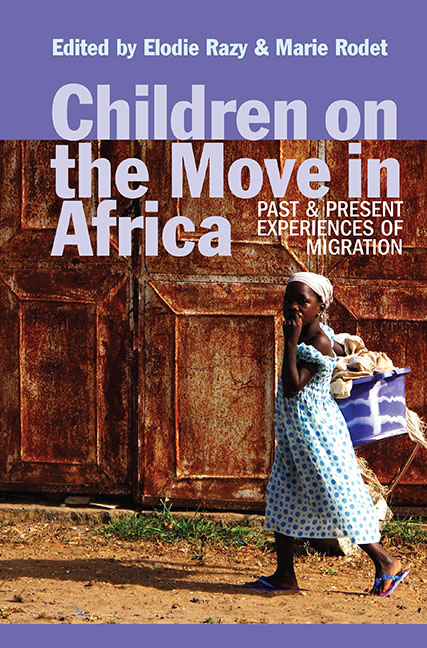Book contents
- Frontmatter
- Contents
- List of Illustrations
- Notes on Contributors
- Preface
- Acknowledgements
- Introduction: Child Migration in Africa: Key Issues & New Perspectives
- Part I CHILD MIGRANTS IN AFRICA: BEYOND THE DILEMMA OF VULNERABILITY v. AGENCY
- Part II BEING A CHILD & BECOMING A GENDERED ADULT: THE CHALLENGES OF MIGRATIONS IN CHILDHOOD
- Part III MOBILITY, IMAGINATION & MAKING NATIONS
- 6. Childhood, Space & Memory: Migrations of the Métis in Madagascar's Central Highlands (Nineteenth & Twentieth Centuries)
- 7. ‘We Were Mixed with All Types’: Educational Migration in the Northern Territories of Colonial Ghana
- 8. India–South Africa Mobilities in the First Half of the Twentieth Century: Minors, Immigration Encounters in Cape Town & Becoming South African
- 9. Education, Migration & Nationalism: Mapping the School Days of the First Generation of Southern Sudanese Nationalist Leaders, c. 1948–1972
- 10. Child Narration as a Device for Negotiating Space & Identity Formation in Recent Nigerian Migrant Fiction
- Bibliography
- Index
7. - ‘We Were Mixed with All Types’: Educational Migration in the Northern Territories of Colonial Ghana
from Part III - MOBILITY, IMAGINATION & MAKING NATIONS
Published online by Cambridge University Press: 25 October 2017
- Frontmatter
- Contents
- List of Illustrations
- Notes on Contributors
- Preface
- Acknowledgements
- Introduction: Child Migration in Africa: Key Issues & New Perspectives
- Part I CHILD MIGRANTS IN AFRICA: BEYOND THE DILEMMA OF VULNERABILITY v. AGENCY
- Part II BEING A CHILD & BECOMING A GENDERED ADULT: THE CHALLENGES OF MIGRATIONS IN CHILDHOOD
- Part III MOBILITY, IMAGINATION & MAKING NATIONS
- 6. Childhood, Space & Memory: Migrations of the Métis in Madagascar's Central Highlands (Nineteenth & Twentieth Centuries)
- 7. ‘We Were Mixed with All Types’: Educational Migration in the Northern Territories of Colonial Ghana
- 8. India–South Africa Mobilities in the First Half of the Twentieth Century: Minors, Immigration Encounters in Cape Town & Becoming South African
- 9. Education, Migration & Nationalism: Mapping the School Days of the First Generation of Southern Sudanese Nationalist Leaders, c. 1948–1972
- 10. Child Narration as a Device for Negotiating Space & Identity Formation in Recent Nigerian Migrant Fiction
- Bibliography
- Index
Summary
The recent attention to children as subjects in studies of migration in Africa is a welcome addition to the growing literature that takes childhood and children's agency seriously. These fields have come together in important areas such as labour and the slave trade; however, other than work on students who travelled abroad to pursue their educations, including Duke Bryant in Chapter 1, there are few historical studies of educational migration within individual colonies. Yet like Hannah Whittaker with Harjyot Hayer in Chapter 9, I explore how colonies often contained a great deal of internal migration for schooling, especially within less-developed regions.
In much of colonial Africa, European Christian mission societies and, later, colonial governments opened Western-style schools both as ‘civilizing’ institutions and as training grounds for future teachers, clerks and administrators. These schools served only a fraction of the child population, and tensions over curricula, discipline, religious instruction and employment opportunities plagued relations between schools and the populations they served. Restrictive policies and low funding limited the availability of schools, particularly those offering classes beyond the primary curriculum, meaning that some children ended up migrating during some part of their schooling. Focusing on students within the Northern Territories of colonial Ghana, this chapter highlights the value of understanding educational migration and the experiences of educational migrants to histories of childhood, schooling and migration in Africa.
In the Northern Territories, where the British administration aggressively restricted the number of schools, few enrolled students actually lived adjacent to educational facilities until the very last years of colonial rule. Thus, for most children who attended school in the region, migration was integral to the educational experience. Even those who were not migrants could expect to learn alongside a significant number of non-local children. Furthermore, the restricted number of schools meant that very few northern children ever attended school at all before the 1950s. Because of these conditions – few schools serving small numbers of students from across the broader region – many scholars have recognized the impact of schooling in the creation of nationalist movements in the north. In this chapter, I draw on interviews, visual evidence and administrative documents to explore what moments and experiences defined the educational migrant identity for the children themselves.
- Type
- Chapter
- Information
- Children on the Move in AfricaPast and Present Experiences of Migration, pp. 141 - 158Publisher: Boydell & BrewerPrint publication year: 2016



